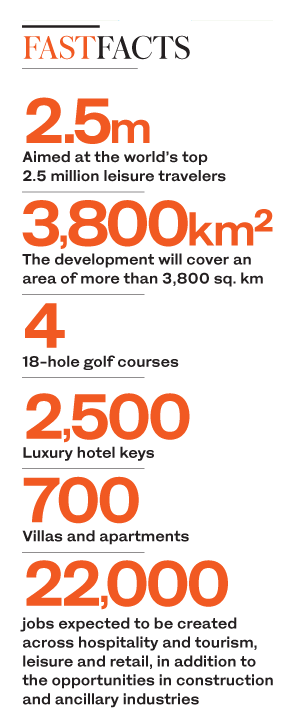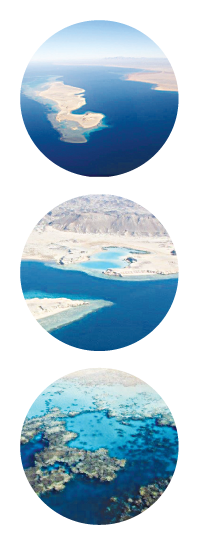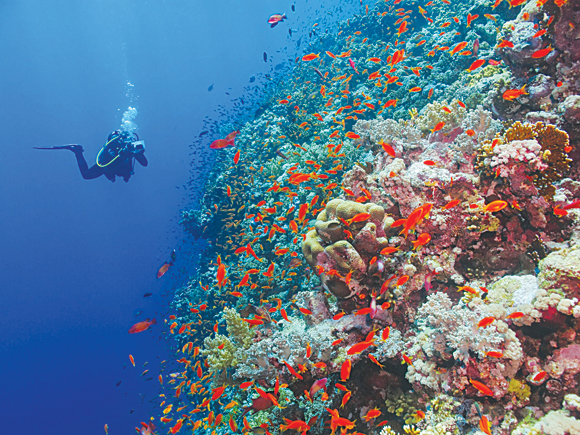LONDON: Picture the scene: A pristine white beach, crystal-clear waters with a yacht or two bobbing in the middle distance.
The days are filled with exploring a rich landscape filled with natural and archaeological wonders or relaxing in complete tranquility, the evenings spent savoring the finest foods and artistic entertainment, and all set against a backdrop of spectacular scenery.
Where is this paradise on earth? South Africa, perhaps? Or somewhere in the South Seas?
Wrong and wrong. It is in fact somewhere far closer to home. Amaala is the name of what is promised to be the ultimate ultra-luxe tourism destination. It is on the Red Sea coast of Saudi Arabia and, if all goes to plan, in just two years’ time it will begin welcoming guests from all over the world.
In 2019, building is set to begin on turning a stretch of undeveloped coastline in the northwest of Saudi Arabia into the “Riviera of the Middle East.”
 Unveiled this week, Amaala is the latest project aimed at creating a fully-fledged tourism industry in Saudi Arabia. Funded initially by the Public Investment Fund (PIF) of Saudi Arabia, it is certainly ambitious, promising to cater to all tastes and desires with bespoke holidays. Adventure, culture, history, sports, relaxation, shopping — Amaala will have them all, with a special focus on “wellness, healthy living and meditation,” as well as its own dedicated airport for “seamless” transfers.
Unveiled this week, Amaala is the latest project aimed at creating a fully-fledged tourism industry in Saudi Arabia. Funded initially by the Public Investment Fund (PIF) of Saudi Arabia, it is certainly ambitious, promising to cater to all tastes and desires with bespoke holidays. Adventure, culture, history, sports, relaxation, shopping — Amaala will have them all, with a special focus on “wellness, healthy living and meditation,” as well as its own dedicated airport for “seamless” transfers.
“Amaala will awaken the world’s imagination by rephrasing the current concept of the luxury tourism experience,” said Nicholas Naples, the newly appointed CEO, who will lead development and operations. “Our concept will provide a rich service offering that exceeds customers’ expectations by providing a comprehensive suite of services not commonly found in one location, that is unique by all measures.”
More specifically, that means “extraordinary architecture” in both the hotels on site offering 2,500 rooms and the private villas and apartments that will be available for purchase.
Galleries, atelier workshops and an art academy will showcase the work of young artists and artisans from Saudi Arabia and the wider Gulf region. There will be a marina for year-round mooring for yachts and other vessels offering “boutique luxury cruises” and diving trips to coral reefs which, unlike many others in the world, are still undamaged.
And for those who simply want to recharge, there will be a wellness retreat with full medical facilities.
Amaala will also host cultural events and conferences. The top priority throughout will be care for the natural environment.
 Amaala is part of Vision 2030, the program of reforms steered by Crown Prince Mohammed bin Salman and the development will be sited within the nature reserve that bears his name.
Amaala is part of Vision 2030, the program of reforms steered by Crown Prince Mohammed bin Salman and the development will be sited within the nature reserve that bears his name.
The target for all this largesse is “the world’s top” 2.5 million leisure travelers. But will they come?
Absolutely, said former hotelier Gaurav Sinha, founder of the Dubai-based Insignia, a company that advises some of the world’s top brands on marketing.
As well as the wonders of nature and superlative standards of service, Amaala offers something far more appealing: The thrill of discovery and the cachet of being among the first to experience a place that is little-known and even less understood.
“This is for what I call ‘culture purists’ — people with an element of the intrepid traveler,” said Sinha. “You have a world heritage
archaeological site on the doorstep in Al-Ula, lovely weather, protected nature — this is the new Shangri La.
“It will also appeal to the intelligentsia — people who are looking to enrich their life experience.”
April Hutchinson, luxury specialist at Travel Trade Gazette, said that tourists in search of the unusual would be drawn to Saudi Arabia.
“A couple of companies have already started looking at Saudi Arabia as somewhere that appeals to those with more refined tastes. It’s the lure of the unknown. In marketing terms, does it offer something different in the region and worldwide? In that respect, it ticks a lot of boxes,” she said. “It’s not Dubai and it doesn’t want
to be.”
While initial funding for Amaala will come from the PIF, there will be opportunities for private investment later and much will depend on which companies are brought in, said Sinha.
“The right brands have to be brought in to operate the assets,” he said. “Positioning the luxury is actually less relevant. What the right name gives is a sense of assurance. The sort of traveler this is aimed at expects a certain standard of service.”
Tourism development expert John Podaras, of Hotel Development Resources, has explored Saudi Arabia’s Red Sea region and pronounces it “stunningly beautiful.”
“The sort of traveler who will come will be well-off but they are not bothered about being pampered. They expect very good service but what they’re after is an authentic experience,” he said.
With that in mind, how far will Saudi Arabia have to go in reconciling its own codes of behavior with the more laissez-faire attitudes of the West?
 “Do you expect visitors to change their behavior or do you create a city within a city, ring-fenced within a wall with its own laws and its own little culture to keep visitors apart from the rest of the country? And if you do that, it is hardly giving them the authentic experience,” Podaras said. He predicts “a significant change” in legislation will be necessary.
“Do you expect visitors to change their behavior or do you create a city within a city, ring-fenced within a wall with its own laws and its own little culture to keep visitors apart from the rest of the country? And if you do that, it is hardly giving them the authentic experience,” Podaras said. He predicts “a significant change” in legislation will be necessary.
However, it would be wrong to assume all potential tourists are coming from Europe or the US.
“Millions of people come to Saudi Arabia every year from Indonesia and other Muslim countries for Hajj. They would love to explore more of the country after the pilgrimage,” said Sinha.
Podaras said that the success of online operators such as halalbooking.com shows that Muslims living in the West are a growing sector of the market. “They might be second or third generation migrants to Western Europe and they want things that make them feel more comfortable, like women-only beaches and alcohol-free hotels,” he said.
Hutchinson believes Amaala is likely to make allowances for non-Muslim visitors. “So many people from the Middle East have been exposed to European
ways through travel so I think they are more used to us,” she said.
However, the experts agreed that Saudi Arabia cannot make any meaningful progress unless it becomes easier — much easier — for visitors to enter the country. Some changes are already on the way; from December, foreigners attending some sporting and cultural
events in the Kingdom will automatically get an electronic visa with their ticket. But whether that will extend to holiday bookings is not clear.
What is clear, however, is that the tourists — and especially those of the caliber that will be drawn to Amaala — are keen on sustainability.
“They want to be sure that everything is being done in a sustainable way. They don’t want to feel they are contributing to damage to the environment. They want to be sure it’s protected and that there is some benefit to the local community,” said Hutchinson. “Saudi Arabia is building from a blank slate which is a great opportunity.”
“There is a certain spirit of audaciousness in this project,” said Sinha. “It’s a beautiful new frontier which requires a tremendous amount of optimism and progressive thinking. The Riviera is not just for Europe.”















